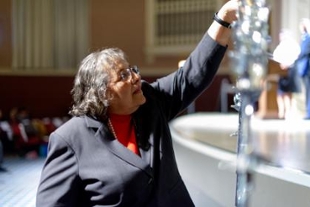Love drives civil rights movement
News
The leading philosophy behind the civil rights movement was not nonviolence, but rather the Greek word for love of humankind, agape, said Diane Nash at James Madison University’s annual Martin Luther King Jr. Day formal program.
Nash, an activist, lecturer and businesswoman, began her involvement in the civil rights movement after attending school at Fisk University. There, she began to take workshops under the Rev. James Lawson, who gave her an “increased understanding into what philosophy the Civil Rights Movement was based.” This understanding allowed her to realize there are two principles that factor into the idea of agape.
The first principle states that people are never the enemy. Using violence to bring about social change means that only the person is hurt, not the oppressive social system. The second principle states that oppression always requires the cooperation of the oppressed and the oppressor. Oppression is done in partnership, but if the oppressed take away their participation, the oppressive system falls apart. When Nash first experienced segregation in a restaurant, she said that by following the oppressive system, she was agreeing that she was “too inferior to walk through the same doors” and found it humiliating.
According to Nash, there are six parts that make up an agapic campaign for social justice. The six parts include: investigating the social problem, educating constituents, negotiating with the oppressors, holding demonstrations, resisting oppression by withdrawing participation from the system and ensuring the problem does not reoccur through continued education for future generations.
Nash stressed the importance of using agape when approaching a social issue since “the Civil Rights Movement was not Martin Luther King Jr’s. movement, but a people’s movement.” It is important for people to learn about issues they want to make a difference in, stop cooperating with social systems and take action.
Nash strongly supports and encourages young people who take action within their community, and ended her speech by saying, “I want you to know that I am so proud of you.”
Nash’s Jan. 18 presentation in Wilson Hall Auditorium was part of the Martin Luther King Jr. Celebration Week, which is sponsored by the Center for Multicultural Student Services.
# # #
By Sam Roth (’17)
Jan. 19, 2016

